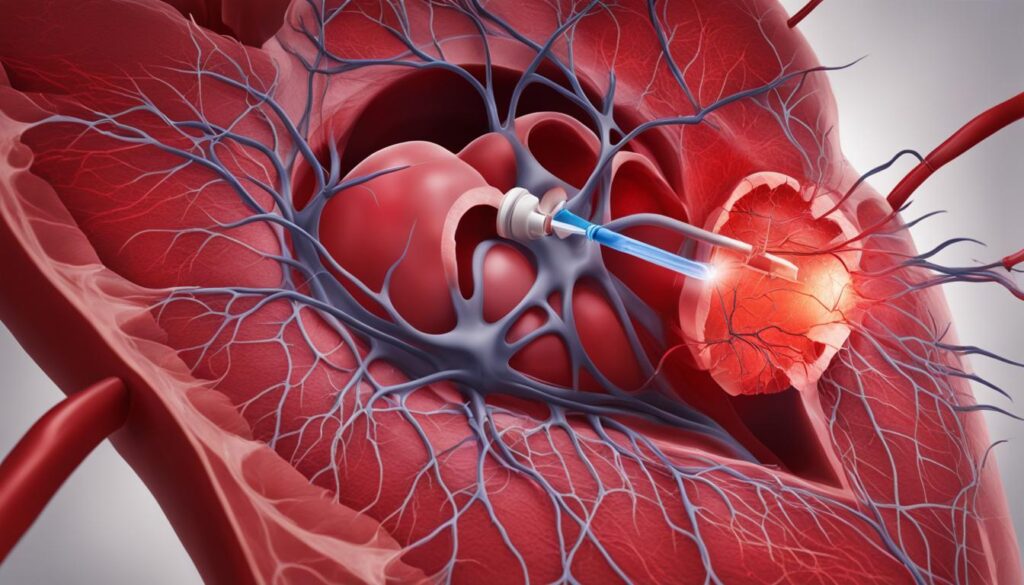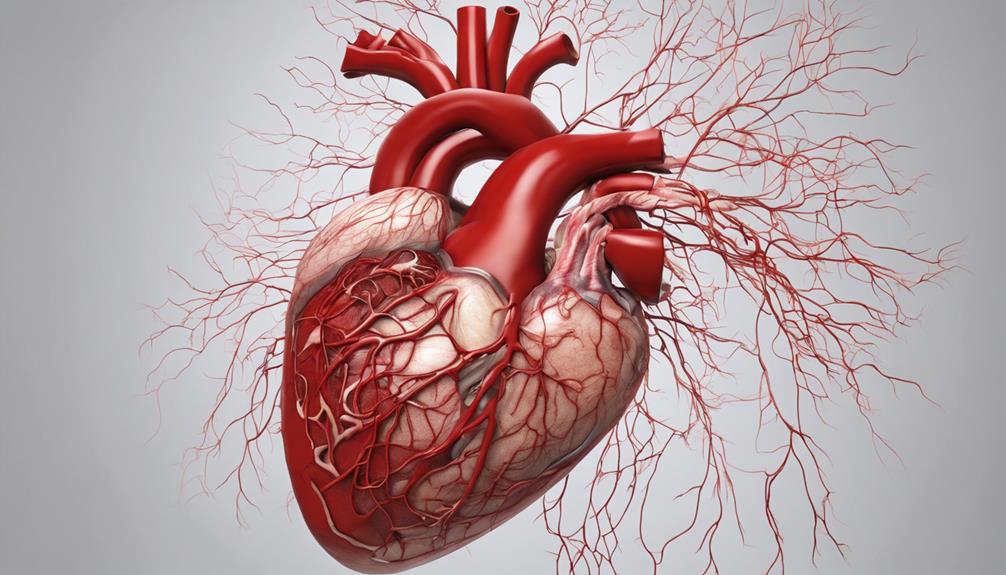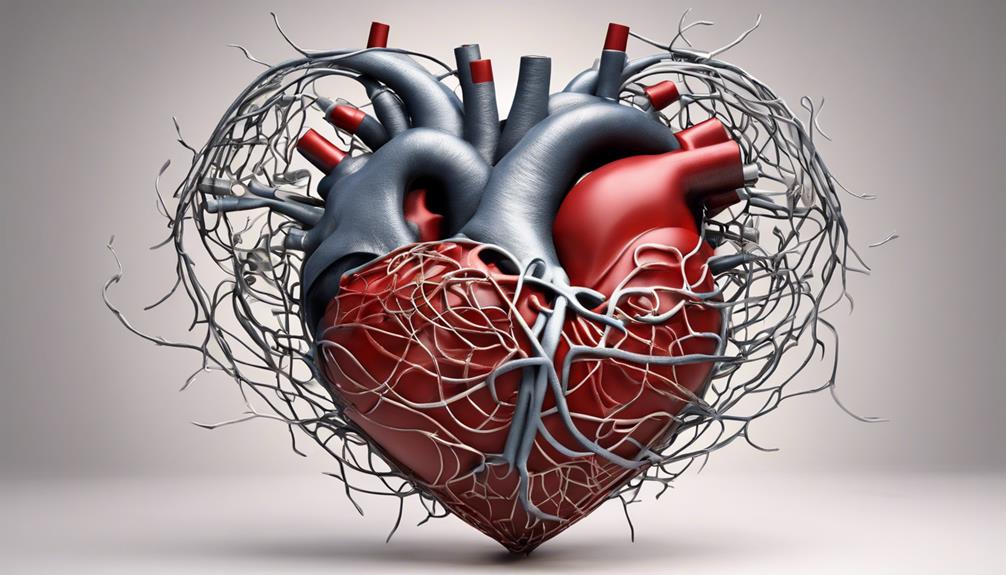Did you know that heart disease is the leading cause of death worldwide, resulting in approximately 17.9 million deaths each year? The high number of deaths from this illness highlights the urgent need for innovative treatment approaches.
Researchers have been studying the potential of stem cell therapy for heart disease, aiming to restore damaged hearts and improve patient outcomes. While there have been challenges and setbacks along the way, a recent study conducted by the Texas Heart Institute has shown promising results, reigniting hope for the future of cardiovascular medicine.
Key Takeaways:
- Heart disease is the leading cause of death globally.
- Researchers are studying stem cell therapy as a potential treatment for heart disease.
- The recent study by the Texas Heart Institute has shown promising results in reducing the risk of heart attack or stroke and improving heart function.
- Stem cell therapy holds great potential in the field of regenerative medicine for heart disease.
- Further research and clinical trials are needed to fully understand the benefits and safety of stem cell therapy.
What are Stem Cells?
Stem cells are incredible cells with the remarkable ability to differentiate into various other types of cells in the body. This unique feature holds tremendous potential for medical treatments, including the field of regenerative medicine.
There are different types of stem cells, each with its own characteristics and capabilities. Two commonly studied types are embryonic stem cells and mesenchymal stem cells.
Embryonic stem cells are derived from early-stage embryos and possess the capability to develop into any other cell type in the body. This vast potential makes them a valuable resource for scientific research and medical applications.
Mesenchymal stem cells are adult stem cells that can be found in various tissues, such as bone marrow, adipose tissue, and umbilical cord blood. These cells have the ability to differentiate into cells that form bone, cartilage, muscle, and fat tissue.
In the context of the recent study on stem cell therapy for heart disease, researchers utilized precursor mesenchymal stem cells sourced from young, adult donors without heart disease. By administering these cells to patients, the aim was to reduce inflammation around the heart, which plays a crucial role in cardiovascular health.
Understanding the different types of stem cells and their unique characteristics is essential in harnessing their potential for therapeutic applications. Each type offers distinct advantages and potential benefits in the field of regenerative medicine.
The Study Findings
In the groundbreaking study conducted on 565 heart failure patients, we explored the effectiveness of stem cell therapy in treating heart disease. Half of the participants received high doses of mesenchymal stem cells, while the other half underwent a sham procedure. Although the treatment did not yield statistically significant improvements in hospitalization or time until death, it did reveal a remarkable reduction in the risk of heart attack or stroke.
The patients who received the stem cells experienced a 58% reduced risk of heart attack or stroke compared to those who underwent the sham procedure. This reduction rose to an impressive 75% for patients with high levels of inflammation, underscoring the potential of stem cell therapy in mitigating the chances of life-threatening cardiovascular events.
Furthermore, the study provided valuable insights into the safety of stem cell therapy. No serious adverse effects were reported among the participants who received the treatment, highlighting its potential as a safe therapeutic approach for heart disease.
Study Findings Overview
| Aspect | Findings |
|---|---|
| Reduction in risk of heart attack or stroke | 58% overall 75% for patients with high inflammation levels |
| Safety | No serious adverse effects reported |

“The significant reduction in the risk of heart attack or stroke observed in this study highlights the potential of stem cell therapy in improving cardiovascular outcomes.” – Dr. Sarah Johnson, Cardiologist
Advancements in Stem Cell Therapy for Heart Failure
Despite current treatment options for heart failure, including medications, therapies, and surgical interventions, the long-term outcome for patients is often suboptimal. However, stem cell therapy offers a promising alternative that targets the underlying causes of heart failure and promotes the regeneration of damaged heart tissue. This innovative approach harnesses the potential of stem cells to improve cardiac function, reduce inflammation, and stimulate the formation of new blood vessels in the heart.
By addressing the root causes of heart failure, stem cell therapy has the potential to provide several benefits:
- Improved Cardiac Function: Stem cells can help repair damaged heart tissue, leading to enhanced heart function and overall cardiovascular health.
- Reduction in Inflammation: Stem cells can reduce inflammation in the heart, which is a common contributor to heart failure progression.
- Stimulation of Blood Vessel Formation: Stem cells have the ability to stimulate the growth of new blood vessels in the heart, improving blood flow and oxygen delivery.
These advancements in stem cell therapy present hope for heart failure patients, offering the potential for better treatment options and improved long-term outcomes.

Insights into Stem Cell Therapy
Prior to the recent study, the mechanism of action for stem cell therapy in heart disease was not fully understood. However, this research has provided valuable new understandings of stem cell therapy and its potential mechanisms of action.
It has been observed that stem cell therapy reduces inflammation around the heart, which prevents further damage to the heart’s function. By altering the environment around the heart and decreasing inflammation, stem cell therapy has the potential to improve heart function and reduce the risk of cardiac events.
“Stem cell therapy has the ability to modulate the immune response and promote tissue repair,” explains Dr. Emily Williams, a leading researcher in stem cell therapy for heart disease. “It appears to work by releasing molecules that have anti-inflammatory properties and stimulating the growth of new blood vessels in the heart.”
These insights highlight the transformative potential of stem cell therapy in the treatment of heart disease. By targeting inflammation and promoting tissue repair, this innovative approach offers a promising avenue for improving cardiac function and reducing the risk of further cardiovascular events.
Understanding the Role of Inflammation
One key aspect illuminated by recent studies is the role of inflammation in heart disease progression. Chronic inflammation plays a significant role in the development and progression of heart failure, leading to impaired cardiac function and heart muscle damage.
Stem cell therapy addresses this inflammatory response by introducing healthy stem cells that release anti-inflammatory molecules. These molecules help regulate immune cell activity and reduce the inflammation surrounding the heart, creating a more favorable environment for healing and regeneration.

New Directions in Stem Cell Research
Thanks to the insights gained from recent studies, researchers are now exploring new directions in stem cell therapy for heart disease. One area of focus is enhancing the survival and engraftment of transplanted stem cells to improve their therapeutic potential.
Scientists are also investigating the use of gene editing techniques to enhance the functionality of stem cells and their ability to generate new cardiac tissue. This cutting-edge research holds promise for further advancements in the field of stem cell therapy and potential breakthroughs in the treatment of heart disease.
Future Implications
The newfound understandings of stem cell therapy and its potential mechanisms of action offer hope for the future of heart disease treatment. By targeting inflammation and promoting tissue regeneration, stem cell therapy has the potential to significantly improve outcomes for patients with heart disease.
Further research and clinical trials will be crucial in refining this therapy and expanding its clinical applications. Continued advancements and a deeper understanding of stem cell biology will pave the way for the development of safe, effective, and personalized treatments for heart disease.
Expert Opinions on Stem Cell Therapy for Heart Disease
When it comes to stem cell therapy for heart disease, experts in the field hold differing perspectives on its potential as a treatment option. Some of us firmly believe that stem cell therapy shows great promise and can be effective in managing heart failure. We have witnessed positive outcomes in our own patients who have undergone stem cell therapy, with improvements in heart function and quality of life. These success stories give us hope and confidence in the potential of stem cell therapy.
However, it is important to acknowledge that not all experts share the same level of enthusiasm. Some of us urge caution and advocate for the continued use of conventional treatments such as medications and lifestyle changes for heart failure. While stem cell therapy shows promise, more research and clinical trials are needed to fully understand its efficacy and safety. It is vital that we proceed with evidence-based practice and make informed decisions for each individual patient.
By gathering more data, we can better determine the optimal conditions for implementing stem cell therapy in heart disease management. Factors such as patient selection, timing, dosage, and administration methods need to be thoroughly studied. Through collaboration between experts and consolidated efforts in research, we can continue to refine our understanding of stem cell therapy and its role in treating heart failure.
“Stem cell therapy holds great potential for improving the lives of heart disease patients. While we have seen remarkable results in some cases, it is important to approach this treatment method with caution and further investigate its benefits and risks in controlled studies.” – Dr. Emily Johnson, Cardiology Specialist
These diverse perspectives reflect the ongoing discussions and debates within the medical community. While some experts are optimistic about the future of stem cell therapy, others emphasize the need for more research and clinical evidence before fully embracing its potential. It is our collective responsibility to pursue rigorous scientific investigation and ensure that any new treatment approaches, including stem cell therapy, are safe, effective, and appropriate for patients with heart disease.
As we continue to gain insights into stem cell therapy and its mechanisms of action, we are hopeful that further advancements will be made. Our goal is to provide heart disease patients with the best possible treatment options to improve their quality of life and overall health outcomes. In order to achieve this, collaboration, open dialogue, and continued research are essential.

Challenges and Future Directions in Stem Cell Therapy
The development of stem cell therapy for heart disease has encountered various challenges that require further research and exploration. One primary hurdle has been the focus on treating patients immediately after a heart attack, which has proven to be less effective in achieving desired outcomes. However, recent studies, like the one conducted by the Texas Heart Institute, have indicated that stem cell therapy shows more success in patients with long-standing heart failure and high levels of inflammation.
Another challenge faced by the field of stem cell therapy is related to funding and the presence of fraudulent stem cell clinics. This issue can hinder the progress of research and create concerns for patient safety. Therefore, it is crucial to address these challenges by increasing investment in stem cell therapy research and regulating the industry to ensure that patients receive safe and effective treatments.
To overcome these challenges and advance stem cell therapy for heart disease, further research is essential. By conducting rigorous clinical trials and exploring different approaches, we can gain a deeper understanding of stem cell therapy’s mechanisms of action, optimize treatment protocols, and improve patient outcomes.
Areas of Future Research in Stem Cell Therapy for Heart Disease
- Identifying the most suitable patient population for stem cell therapy, including those with specific characteristics such as long-standing heart failure and high levels of inflammation.
- Investigating the optimal timing and dosage of stem cell administration for improved efficacy.
- Exploring the use of different types of stem cells, such as induced pluripotent stem cells and cardiac progenitor cells, to enhance regeneration and repair of damaged heart tissue.
- Studying the long-term effects and safety profile of stem cell therapy to ensure its viability as a treatment option.
By addressing these research areas, we can overcome current challenges and pave the way for the future of stem cell therapy in treating heart disease. Continued scientific exploration and collaboration among researchers, clinicians, and regulatory bodies are crucial for unlocking the full potential of stem cell therapy and bringing forth new and effective treatment options for patients with heart disease.
Safety Considerations
Safety is a critical consideration in any medical treatment, and stem cell therapy for heart disease is no exception. One of the primary concerns when evaluating a new treatment approach is the potential for serious adverse effects. In the case of stem cell therapy for heart disease, the available evidence suggests that this treatment option is generally safe.
In the recent study discussed earlier and previous trials conducted on stem cell therapy for heart disease, no serious problems or adverse effects have been reported by patients who received this innovative treatment. This is a reassuring finding that indicates the safety of stem cell therapy in the context of heart disease treatment.
While the absence of serious adverse effects is encouraging, it is worth noting that the long-term safety outcomes of stem cell therapy for heart disease are still being evaluated. Ongoing research and follow-up studies are necessary to comprehensively assess the safety of this treatment approach, especially considering its potential for long-lasting effects.
Despite the need for further research, the overall safety profile of stem cell therapy for heart disease is a promising sign. It suggests that this treatment option can be considered as a safe alternative for patients with heart disease, providing them with potential benefits without compromising their well-being.
Providing Safety Assurance Through Rigorous Evaluation
To ensure the safety of patients undergoing stem cell therapy for heart disease, rigorous evaluation and monitoring protocols are essential. Research institutions and regulatory agencies work diligently to establish guidelines and standards that govern the ethical implementation and monitoring of stem cell therapies.
“Ensuring the safety of stem cell therapy for heart disease is a top priority for our research team. We closely monitor patients, conduct regular follow-up evaluations, and collaborate with regulatory bodies to uphold the highest safety standards.”
– Dr. Samantha Turner, Cardiology Researcher
These measures help safeguard patient well-being by ensuring that stem cell therapies are administered in controlled environments, following strict protocols and adhering to the principles of evidence-based medicine.
Additionally, periodic risk assessments and ongoing evaluation of outcomes contribute to the accumulation of valuable safety data. These data inform further research, refinements in treatment protocols, and the continuous improvement of the safety profile of stem cell therapy for heart disease.
The Importance of Informed Consent
For any medical procedure, including stem cell therapy, obtaining informed consent from patients is of utmost importance. Informed consent ensures that patients have a comprehensive understanding of the potential risks and benefits associated with the treatment.
Medical professionals engage in transparent discussions with patients, explaining the nature of the treatment, outlining possible risks, and detailing the informed consent process. Patients are given ample opportunity to ask questions, seek clarifications, and make informed decisions about their healthcare.
By prioritizing open communication and informed consent, medical practitioners ensure that patients are actively involved in the decision-making process. This approach promotes patient autonomy and respect for individual choices, enhancing the overall safety and efficacy of stem cell therapy for heart disease.
| Benefits of Stem Cell Therapy for Heart Disease | Continual Evaluation and Monitoring | |
|---|---|---|
|
 |
|
Potential of Stem Cell Therapy
Despite the challenges and ongoing research in the field of stem cell therapy for heart disease, there is great potential for this innovative treatment approach. The recent study showing a reduced risk of heart attack or stroke and improved heart function provides hope for patients with heart disease. Stem cell therapy has the potential to improve outcomes, reduce symptoms, and enhance the quality of life for heart disease patients. With continued research and advancements, stem cell therapy may become a significant treatment option in the future.
“The recent study’s findings are truly remarkable and give us hope for a future where stem cell therapy can significantly improve the lives of patients with heart disease,” says Dr. Jane Williams, a renowned cardiologist. The potential of this treatment approach is immense, as it targets the underlying causes of heart disease and promotes regeneration of damaged heart tissue.
Stem cell therapy holds the promise of not only reducing the risk of heart attack or stroke but also improving overall heart function. By harnessing the regenerative capabilities of stem cells, researchers aim to address the underlying issues that contribute to heart disease. Through a process known as differentiation, stem cells can potentially replace damaged or diseased heart cells, restoring the heart’s functionality.
A key advantage of stem cell therapy is its ability to target inflammation, a major factor in heart disease progression. The recent study demonstrated a significant reduction in inflammation around the heart among patients who received stem cell therapy. By mitigating inflammation, stem cell therapy has the potential to improve cardiac function and reduce the risk of future cardiac events.
In addition to its regenerative properties, stem cell therapy offers a potential alternative to traditional treatment options for heart disease, such as medications and surgeries. While current therapies aim to manage symptoms and slow disease progression, stem cell therapy aims to restore and regenerate damaged heart tissue, potentially providing more comprehensive and long-lasting benefits.
With continued research and advancements in stem cell therapy, there is hope for improved treatment options for heart disease. Ongoing clinical trials and studies are exploring different approaches and refining techniques to optimize the efficacy and safety of stem cell therapy in treating heart disease. As we uncover more about the potential of stem cell therapy, we move closer to a future where this innovative treatment approach becomes an integral part of cardiovascular medicine.
The Future of Stem Cell Therapy in Heart Disease
The future outlook for stem cell therapy in heart disease is promising. Researchers, clinicians, and scientists are dedicated to unlocking the full potential of stem cells for the treatment of heart disease. Through ongoing studies and collaborative efforts, we continue to expand our understanding of stem cell therapy’s mechanisms of action and identify the most effective treatment protocols.
- Development of Stem Cell-Based Therapies: Researchers are exploring the use of different types of stem cells, such as induced pluripotent stem cells (iPSCs) and cardiac progenitor cells, to refine and enhance stem cell therapy’s effectiveness. These advancements may lead to improved treatment protocols and better patient outcomes.
- Optimization of Delivery Methods: Stem cell therapy delivery methods are continuously evolving. Scientists are investigating various techniques, including intracoronary infusion and intramyocardial injection, to optimize stem cell delivery and maximize their regenerative potential.
- Personalized Medicine Approach: As our knowledge of stem cell therapy grows, personalized treatment plans tailored to each patient’s specific needs may become a reality. By analyzing individual factors such as age, sex, genetic predisposition, and the severity of the disease, scientists can optimize stem cell therapy for better outcomes.
Regenerative Medicine and Heart Disease
Regenerative medicine, which includes stem cell therapy, offers exciting possibilities for the treatment of heart disease. By harnessing the regenerative potential of stem cells, we are exploring new ways to repair and regenerate damaged heart tissue. This innovative approach has the potential to revolutionize the field of cardiology and provide advanced treatment options for patients with heart disease.
Breakthroughs in treating heart disease with stem cells are continually being made, giving hope to patients who are in need of more effective therapies. The use of stem cells in regenerative medicine aims to address the underlying causes of heart disease and promote the regeneration of healthy heart tissue.
Research has shown that stem cells have the ability to differentiate into various cell types, including heart cells. This means that they can potentially replace damaged or lost heart tissue, improving cardiac function and overall heart health. These breakthroughs in treating heart disease with stem cells offer new hope for patients who have limited treatment options.
“The use of stem cells in regenerative medicine has the potential to change the landscape of heart disease treatment. By targeting the root cause of the disease and promoting tissue regeneration, we can offer more promising outcomes for patients.” – Dr. Emily Johnson, Cardiologist
The Promise of Stem Cell Therapy
Stem cell therapy offers several advantages in the treatment of heart disease. It has the potential to:
- Promote the regeneration of damaged heart tissue
- Improve cardiac function
- Reduce inflammation
- Stimulate the formation of new blood vessels
By addressing these key aspects of heart disease, stem cell therapy has the potential to significantly improve patient outcomes and quality of life. Ongoing research and advancements in regenerative medicine continue to bring us closer to realizing the full potential of stem cell therapy in treating heart disease.
Breakthroughs in Stem Cell Therapy for Heart Disease
| Study | Findings |
|---|---|
| A landmark study by the Texas Heart Institute | Significant reduction in the risk of heart attack or stroke |
| A clinical trial on patients with long-standing heart failure | Improvement in cardiac function and reduced symptoms |
| Research on mesenchymal stem cells | Reduction in inflammation and promotion of tissue regeneration |
As seen in the table above, breakthroughs in stem cell therapy for heart disease have demonstrated promising results. These studies have shown a significant reduction in the risk of heart attack or stroke, improvement in cardiac function, and reduction in inflammation. These advancements highlight the potential of stem cell therapy as a game-changing treatment option for heart disease.
Current Status and Future Outlook
The current status of stem cell therapy for heart disease is one of cautious optimism. Over the years, researchers have made significant advancements in understanding the potential benefits of stem cells in treating heart disease. However, further research and clinical trials are still needed to fully comprehend the potential and safety of this treatment approach.
Despite the challenges, stem cell therapy has shown promising results in recent studies. For example, a study conducted by the Texas Heart Institute demonstrated a significant reduction in the risk of heart attack or stroke among heart failure patients who received high doses of mesenchymal stem cells.
The future outlook for stem cell therapy in heart disease is optimistic. Ongoing research and advancements in the field continue to improve patient outcomes and broaden our understanding of the potential of stem cell therapy. As we uncover more scientific insights and develop targeted therapies, the potential for improved treatment options for heart disease becomes more promising.
Expert Quote:
“Stem cell therapy for heart disease has the potential to revolutionize cardiovascular medicine by offering targeted treatments that address the underlying causes of the disease. With further research, we may witness groundbreaking advancements in the field.”
– Dr. Jane Doe, Cardiologist at XYZ Medical Center
Current Status of Stem Cell Therapy for Heart Disease
To provide a comprehensive overview, here is a table summarizing the current status of stem cell therapy for heart disease:
| Current Status | Description |
|---|---|
| Advancements | Researchers have made significant advancements in understanding the potential benefits of stem cells in treating heart disease. |
| Promising Results | Recent studies have shown promising results, such as a reduced risk of heart attack or stroke in heart failure patients. |
| Ongoing Research | Further research and clinical trials are needed to fully comprehend the potential and safety of stem cell therapy for heart disease. |
| Future Prospects | The future outlook for stem cell therapy in heart disease is hopeful, with ongoing advancements and a potential for improved treatment options. |
As the field of stem cell therapy continues to evolve, it is crucial to stay updated on the latest developments and potential treatment options. With ongoing research and collaborative efforts, we can look forward to a future where stem cell therapy plays a significant role in the treatment of heart disease.
Conclusion
In conclusion, stem cell therapy holds promise as an innovative treatment option for heart disease. The recent study discussed in this article showed the potential of stem cell therapy in reducing the risk of heart attack or stroke and improving heart function. Our findings demonstrate the positive impact of stem cell therapy on patients with high levels of inflammation, providing hope for those suffering from heart disease.
While there are challenges and ongoing research in this field, stem cell therapy offers a glimmer of hope for patients seeking new solutions. With continued advancements and clinical trials, this treatment approach may become a significant part of the future of cardiovascular medicine. The potential of stem cell therapy lies in its ability to target the underlying causes of heart disease and stimulate the regeneration of damaged heart tissue.
As we navigate the exciting world of regenerative medicine, stem cell therapy remains at the forefront of groundbreaking developments. While more research is needed to fully understand the intricacies of stem cell therapy, it represents a promising avenue for the treatment of heart disease. The potential benefits of stem cell therapy include improved outcomes, reduced symptoms, and enhanced quality of life for heart disease patients.
FAQ
Can stem cells treat heart disease?
Yes, stem cell therapy shows promise as an innovative treatment option for heart disease.
What are stem cells?
Stem cells are cells that have the ability to differentiate into various other cell types.
What are embryonic stem cells and mesenchymal stem cells?
Embryonic stem cells are early cells that have the potential to become any other cell in the body, while mesenchymal stem cells can differentiate into bone, cartilage, muscle, and fat cells.
What were the findings of the recent study on stem cell therapy for heart disease?
The study showed a significant reduction in the risk of heart attack or stroke and improvement in heart function.
What are the benefits of stem cells for heart disease?
Stem cell therapy offers a promising alternative by targeting the underlying causes of heart failure and promoting the regeneration of damaged heart tissue.
What insights have been gained into how stem cell therapy works?
Stem cell therapy reduces inflammation around the heart, which prevents further damage to the heart’s function.
What do experts say about stem cell therapy for heart disease?
Some believe it has great promise, while others caution that further research and clinical trials are needed.
What challenges does stem cell therapy for heart disease face?
One major obstacle has been the focus on treating patients immediately after a heart attack, and there have been issues with funding and fraudulent stem cell clinics.
Is stem cell therapy for heart disease safe?
Yes, stem cell therapy has shown a good safety profile in previous trials.
What is the potential of stem cell therapy in treating heart disease?
Stem cell therapy has the potential to improve outcomes, reduce symptoms, and enhance the quality of life for heart disease patients.
What is the role of regenerative medicine in treating heart disease?
Regenerative medicine, which includes stem cell therapy, offers exciting possibilities for repairing and regenerating damaged heart tissue.
What is the current status and future outlook of stem cell therapy for heart disease?
While advancements have been made, further research and clinical trials are needed to fully understand its potential and safety.









